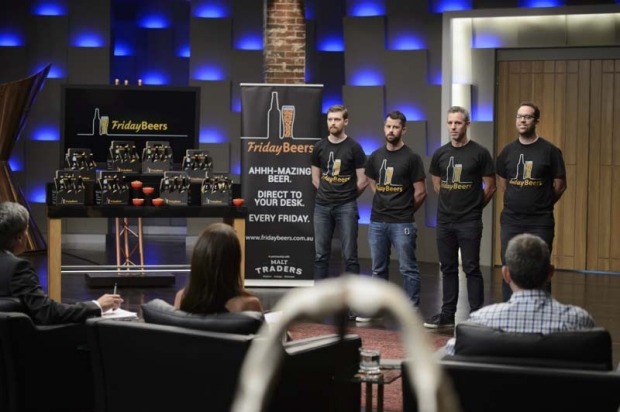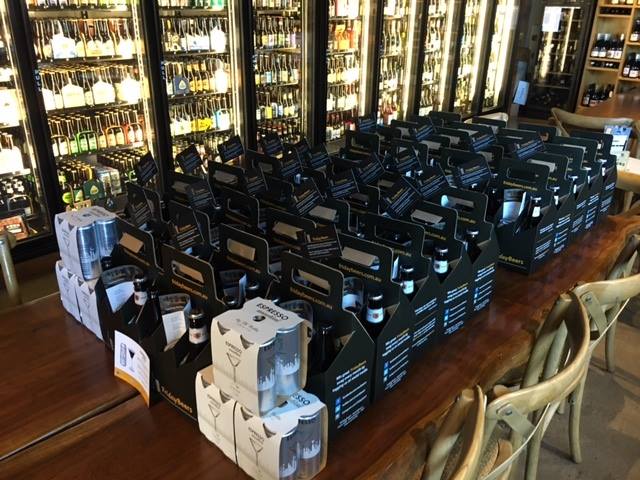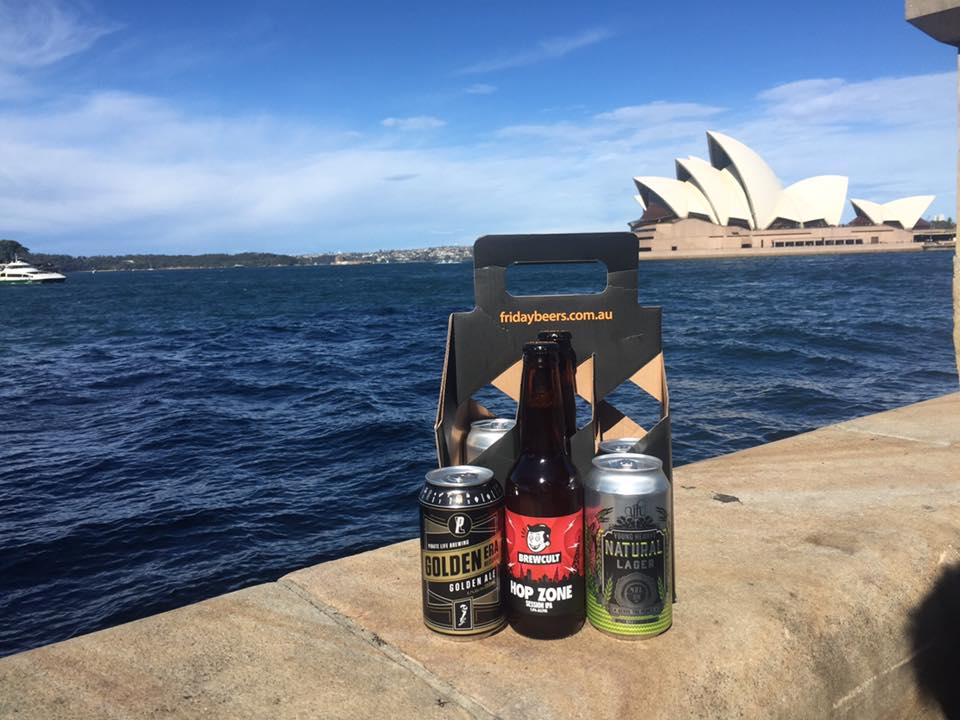How could a moment of laziness lead to an appearance on Shark Tank and an expanding business that has become more work than an actual full-time job? Friday Beers can answer that question. About 18 months ago, Lee Mathers just wanted a cold beer on a Friday afternoon, and set about solving his own problem. His story is an example of how quickly entrepreneurship can get out of hand when you hit on a good idea.
Lee is one of the founders of Friday Beers, an Australian company that will deliver a selection of cold craft beers right to your desk in Brisbane or Sydney. Its success is proof that cubicle life is thirsty work.
Friday Beers is a full time gig for Lee, and also keeps his cofounders on the hop. They appeared on Season 2 of Shark Tank in July of 2016, and were successful in their bid for a Shark (Steve Baxter) as a partner.

I’d love to say we caught up over a couple of cold ones, but the reality was still a pretty interesting Skype conversation between Lee and myself. As far as I know, neither of us were drinking anything stronger than coffee at the time.
Ali: I’ll start by asking you to tell me a little bit about the catalyst for starting Friday Beers.
Lee: This all came about – as I think many Australian things come about – because I was incredibly lazy. I really wanted a beer on a Friday afternoon, but I was too lazy to go and get one from the bottle shop because our bottle shop was a little bit of a hike away from where I was working.
[At the time], I’m like: it’s 2015. Surely in this day and age, somebody can deliver beer to me. There are plenty of beer delivery services out there, but none of them could deliver it to me cold. I’m like, I want decent beer on a Friday afternoon and I want it cold. It didn’t exist so [I thought], hey, I reckon we’re onto something here.
So we built a really sh*$%y website and absolute minimum viable product. Then I teamed up with a mate of mine who owns a couple of bottle shops in the city [in Brisbane]. He was able to supply us with the alcohol. Then we just started signing people up and it took off from there.
Ali: That’s brilliant. After a year, how many customers do you have?
Lee: We do about 100 deliveries every Friday up in Brisbane. We’re at half of that in Sydney at the moment. But Sydney’s certainly growing faster than Brisbane. The aim is to do at least 500 deliveries by the end of the year, every Friday in Brisbane and Sydney. We’ve got a big waiting list in Melbourne so we think there’s a lot of interest. [In September 2017], we want to be doing 1000 deliveries on a Friday afternoon.
Ali: Oh, wow. That’s 1000 happy people on a Friday afternoon. How many people work in your company if you are looking at that kind of growth?
Lee: Surprisingly, there’s only the four of us: the four founders. We all still do the deliveries and organisation and everything else. For the other three, it’s a part-time gig. For me, it’s pretty much a full-time gig these days because we’re expanding now into on-demand deliveries as well. We’re teaming up with a logistics partner to be able to do the on-demand stuff.
One of the criticisms from Steve Baxter – who is the Shark that backed us – was that we’re painting ourselves in the corner by calling ourselves Friday Beers and only doing deliveries on Friday.

Ali: Interesting. Would you start a new company or would you rename the one you already have? Or keep going with the name of Friday Beers and just deliver on Mondays?
Lee: We’ll always call it Friday Beers because that’ll always be our core product: those beers that just turn up automatically on a Friday afternoon. But we’ll expand into on-demand beer delivery and wine delivery and all the add-ons: chips, and charcuterie platters, and cheese boards, and everything that people like as well. We’ll expand that out across different days.
Ali: So cool. If I worked in an office, I would absolutely just be ordering up my Friday celebrations.
Lee: Our long-term goal with this is to take it to New Zealand, take it to the US, expand as much as we can. We’ll need to set up city managers in each place. We’ll need to do another round of fundraising and all the stuff that goes with that. That’s definitely in the pipeline.
There’s a lot of work. That’s the thing. For a one day a week business, I’m still working on it seven days a week. There’s still a lot of work that goes into setting that stuff up and setting our systems up, but that’s part of the fun, I suppose.
Ali: It sure is. With your deliveries, do you deliver to people’s offices or people’s homes?
Lee: We do both. I mean our biggest focus is definitely those office drinks on a Friday afternoon. That seems to be such an Australian thing. Everybody knocking off at about 3:00, 3:30, maybe 4:00, having one or two beers in the office and then maybe going to the pub or even going home.
It’s such a traditional thing in the CBDs at least, that we’ve been able to pick up a lot of those customers very easily. We’ve had a really good reception. Everybody thinks it’s a great idea. It’s just about signing up as many people as we can.
Ali: For sure. I think it’s a great idea, and I can definitely see why it’s so popular. So you’re the technical founder: how did you decide to use WooCommerce as your platform?
Lee: I suppose I’ve been using WordPress now for close to 10 years. I knew the WordPress platform pretty well. [In the past] I experimented with eCommerce systems and never found anything that ticked all the boxes.
Then WooCommerce came along way before it was picked up by Automattic. Out of the box it just worked, but it gave [us] the ability to write quite a few plugins that we use ourselves. It’s got that flexibility to do exactly what you want without breaking the entire ecosystem, or [at least] very easily being able to find where conflicts are.
I absolutely love it. Compare it to things like Magento: I realise that Magento’s definitely got an eCommerce focus as opposed to the base WordPress installation that then has WooCommerce sitting on top of it. But I still think it’s so much easier to use.
[And] it’s so much easier to teach other people to use because one of [my aims], obviously, is to not spend all the time doing technical stuff. [I want to] actually get out there and grow the business as well. It’s easy to use. [I’m] able to show other staff how to generate reports and how to deal with orders through the backend.

Ali: Fantastic.
Lee: I love it. I love it. WooCommerce Subscriptions is the best plugin I’ve ever come across. We couldn’t exist without it.
Ali: Well, that’s so good to hear. It’s why do what we do – it’s all about helping people like you to live your entrepreneurial dream. How would you say that offering a subscription payment based system has helped with your business?
Lee: Australians are still coming to terms with the subscription concept that you can cancel and suspend at any time. I think the problem we’ve got in Australia is that our idea of a subscription is something like Foxtel or a gym subscription that’s really hard to cancel. You feel like you’re locked in.
It [Subscriptions] will always be our base product because it [has] the ability to set it up and just forget it and then magically every Friday, those cold beers just appear on your desk. [And] still giving the customer the ability to manage that entire interaction. That’s where the WooCommerce Subscriptions plugin is just absolutely brilliant because it does allow that they can suspend or cancel at any time.
Ali: Awesome. So how do you find your customers?
Lee: We do a lot of Facebook marketing and a lot of AdWords. We know where our customers are. We’ve just signed a deal with a company in Australia that does concierge services for office buildings. We’ll be able to get direct access to all the people at about 30 office buildings in Brisbane and Sydney.
We also do a lot of standing on street corners and handing out flyers as people are walking into [work]. We’ve got a couple of costumes where you dress up and you look like a glass of beer. We do that on a Monday morning and then a Friday morning as well.
Ali: That’s so cool.
Lee: It’s very old school, but because we know exactly where our people are, it’s just about making them aware that we exist.
Ali: Brilliant. And your background is law, but you’ve never practised law?
Lee: Never practised no. There [are] too many lawyers in the world. I don’t need to add to the problem.
Ali: There’s a lot more demand for coding, web development, all that stuff anyway.
Lee: That’s exactly right. I thought you were going to say, there’s a lot more demand for beer. I’m like, yes, I know.
Ali: There is.
Lee: I bloody well hope so.
Ali: The world would be a very different place if we needed more lawyers than beers on a Friday afternoon. So what are the biggest challenges you faced in setting up Friday Beers?
Lee: It was not drinking all the beer, I suppose. That’s the day-to-day challenge. Being serious, the biggest challenge we’ve had is just the logistics of trying to get lots of beer to people on a Friday afternoon and make sure that it keeps cold… and at the price point that we want it at.
There are plenty of companies out there at the moment that will do on-demand delivery for us and even structured delivery. They do it at a price point that obviously makes them a profit, but then makes us unprofitable.
At the moment, I’m building a system that helps automate that, but it’s a system that we’ll end up running. I think eventually Friday Beers will have an offshoot that does mass delivery in a short period of time at a very low cost. We’ll have a system that helps automate that process and deals with a lot of delivery people.

Say a bank wants to do a delivery to 1,000 of its clients in the CBD on a Tuesday afternoon. We’ll have the system and the infrastructure to go out and do that for a couple of bucks per delivery, as opposed to the $10 to $15 that most places want to charge now.
There are long-term goals with the infrastructure that we’re building at the moment as well. That has and always will be our biggest challenge, is just getting cold beer into our customers’ hands.
Ali: I was wondering about that problem with respect to your deliveries. On a summer afternoon, it wouldn’t take long for the beers to get warm in the heat of the Australian sun. Are you guys personally running these beers into each of the offices?
Lee: Yeah. I mean, at the moment we’ve got a couple of refrigerated vans. The beer is parked in strategic locations around the city. The delivery guys are just following them. The beer’s always cold.
[But] ultimately, it becomes [about] getting that system more efficient and … what’s the postman delivery problem of trying to find the most efficient route? It’s that, combined with adding more people.
Ali: Looks like some complexity coming up there for you.
Lee: Strangely enough.
Ali: Strangely enough. All you wanted was to be able to order some beers to your desk on a Friday afternoon.
Lee: Yes! Yes. This is exactly it. Here I was; all I wanted was a freaking cold beer on a Friday afternoon and now look what I’ve gone and done. Do you think I get to really enjoy a cold beer on a Friday afternoon now? It’s about 7:00, 7:30, 8:30 [at night] before I bloody get to sit down and actually enjoy a freaking beer.
Ali: You’ve gone and entrepreneured your way into not being able to have a Friday afternoon beer.
Lee: Yes! Yes.

Ali: What do you wish someone had told you before you began this enterprise? That you’ll never have a Friday afternoon beer again?
Lee: Yeah, yeah. Just stop being lazy and walk up the bloody road and get some beer. No. This isn’t my first rodeo. This isn’t my first entrepreneurial journey. I knew what I was in for.
The problem with this stuff is that it always, always takes longer than you think it’s going to take. You are constantly hit in the face with brick walls and roadblocks. I do a lot of reading. I [listen to] a lot of podcasts. It’s only over the last couple of years that people have started to talk about grit, and persistence, and perseverance.
It’s also stubbornness. For me it’s just [BS] when I can’t solve something. It’s trying to find that balance between giving up; and [knowing] okay, that isn’t a way to do something; and that stubbornness [saying] we’re just going to keep going until this works.
I think that’s where a lot of people sometimes fall over. Sometimes it’s too easy to give up because it’s too easy to be distracted by the bright shiny thing over here and the other opportunities, as opposed to just getting stuck in and getting things done. I suppose that’s what I’ve learnt over the last 15 years.
Ali: So with 15 years of experience, you already had advice for yourself when you were starting out. Do you have any advice for anybody else, any words of wisdom, other than not getting distracted by the shiny things?
Lee: Don’t drink your own product. That’s definitely a big one because then you get fat and lazy.
Don’t ever [rule out giving] up because there is sometimes value in [saying] that’s just stupid. [You don’t want to get] yourself into a position of financial stress.
At the same time, you are far more capable of things than your brain actually thinks you are. Going that extra bit further is what generally will help people to succeed. Like running that extra kilometre when you’re feeling dead tired, your body is capable of much more. You as an individual are capable of much more than you think you are. We sometimes psych ourselves out a bit, I think.
Ali: Definitely. One of my mottoes used to be – you never know where your limits are until you go past them.
Lee: Yeah. That’s dead right. It’s not until you look back. You’re like oh, yeah. You can’t say it any other way. That’s perfect.
Ali: You think you can only do so much, but you push yourself. It’s not much fun when you go past your limits, but then you recalibrate and pull back a bit.
Lee: Yeah, because there are days. There are days now. I’ve had businesses that work really well and had lots of staff and made money. I’ve been through that a couple times.
Even now, there are days where you wake up and you just don’t want to get out of bed. You think, what the f$& am I doing with my life? Just go and get a job, and let somebody else worry about paying the bills, and paying payroll, and dealing with HR sht, and all that stuff.
It’s hard. It’s really hard sometimes, but the rewards for that, the flip side is [that] when it does work, it’s so much more satisfying. The potential, the human potential is just amazing sometimes.

Conclusion
Sometimes solving your own problem turns into something much larger than you imagined. Just ask Brent, inventor of WooCommerce Subscriptions and founder of Prospress.
Friday Beers is a brilliant example of what happens when opportunity meets hard work, and what can happen when you believe in the human potential to do more with our time than binge-watching Netflix. It’s both remarkable and ironic that an idea born out of laziness has turned into such an enterprise.
Lee has quite a wealth of experience from his various entrepreneurial rodeos, and his words of wisdom about stubbornness are hard-won. But he’s right on the money when he says don’t ever sell yourself short. You are capable of far more than you think.
And if you find yourself parched after a long week of hustle, and you don’t feel like going out to get those Friday afternoon drinks, you know who to call.

